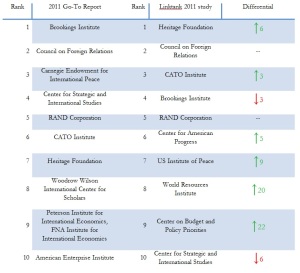Where Are the Black Think Tankers? Background
In June 2012, ambassadors, experts, thinkers, and academics from the G20 countries convened for the inaugural G20 Foreign Policy Think Tanks Summit. The meeting was highly constructive amidst different philosophies and worldviews. The very definition of a “think tank” was up for debate. Ultimately, the participants agreed that think tanks are knowledge-brokers—synthesizers and conveyers of information from academia to government (“Summit Report,” G20 Foreign Policy Think Tank Summit, Think Tanks and Civil Societies Program, International Relations Department, University of Pennsylvania).
Since 2008, the host of that summit, Dr. James G. McGann from Penn’s International Relations Department, has compiled annually a ranking of think tanks from around the globe. It is truly a seminal work, highly regarded and consulted by leading think tankers, policymakers, and journalists. Here’s a blurb about the current Go-To Rankings from TTCSP’s website:
The Global GoTo Think Tank Index is the result of an international survey of over 1,950 scholars, public and private donors, policy makers, and journalists who helped rank more than 6,500 think tanks using a set of 18 criteria developed by the TTCSP.
TTCSP also provides on their website a full explanation of their nomination, evaluation, and ranking process.
Here is the list of the top think tanks from Dr. McGann’s 2012 Go-To Report
- Brookings Institute
- Carnegie Endowment for International Peace
- Council on Foreign Relations
- Center for Strategic and International Studies
- RAND Corporation
- Woodrow Wilson International Center for Scholars
- American Enterprise Institute
- Pew Research Center
- Heritage Foundation
- Cato Institute
But the study that I conducted is more closely related to the 2011 Go-To Rankings because of another set of rankings, which was based on Dr. McGann’s 2011 report. This second study was conducted by DC Linktank.
Linktank originated in 2009 as an email listserv of think tank events in the District and has now grown into “a broader experience for expanding knowledge, making connections, and building careers.” In 2011, Linktank took Dr. McGann’s rankings and recomputed them “based on Alexa web data to determine which think tanks generate the largest interest.” Alexa is a website information company that compiles internet analytics such as web-traffic. Livetank also took into consideration such influence-factors as “Annual Expenditures,” “Annual Contributions,” and events per month on average.
In the table below, you can see how Linktank’s re-computation influenced the Go-To Rankings. Note that some of Linktank’s top ten think tanks didn’t make Dr. McGann’s cut, and vice-versa:
If you’re interested, here is Linktank’s full list of the top 50 think tanks that resulted from their study. It includes annual contributions, expenses, events per month, and Alexa ranking.
Now we’ve arrived at the central research question to this study: Where are the black think tankers? This study is an ethnic investigation into the top ten think tanks as ranked by Linktank in 2011. It is an entirely open-source research project, relying heavily on the websites of these organizations. For more on the intricacies of this study, visit my Methodology section. Otherwise, proceed straight to my Findings.
A quick note on the time-span of this study: while the rankings are from 2011, the ethnic data compiled is current, at least to the extent that these think tanks’ websites are up-to-date. After all, I mapped black/not-black leaders and experts over the past ten days.
Related articles
- Interviews with Participants of the Inaugural G20 Foreign Policy Think Tanks Summit (jafriedel.wordpress.com)
- How did leading US Think Tanks fare in 2012? Analysis by numbers (onthinktanks.org)
- To Alexa or Not to Alexa (thebusinessofhelpingbusiness.wordpress.com)
- Think tanks and their key audiences: what do they have to say? (onthinktanks.org)


Pingback: Where Are the Black Think Tankers? Findings: Graphs and Charts | jafriedel
Pingback: Final Summit Report from the Inaugural G20 Think Tanks Conference | jafriedel
Pingback: Where Are the Black Think Tankers? Methodology | jafriedel
Pingback: Where Are the Black Think Tankers? Commentary and Questions for Further Research | jafriedel